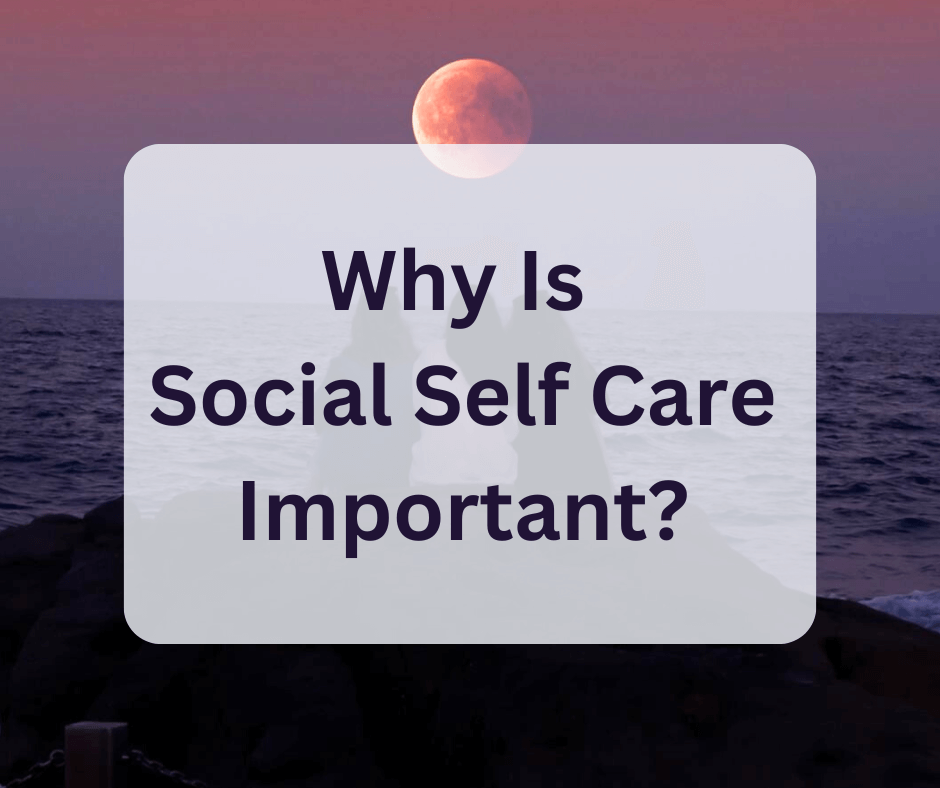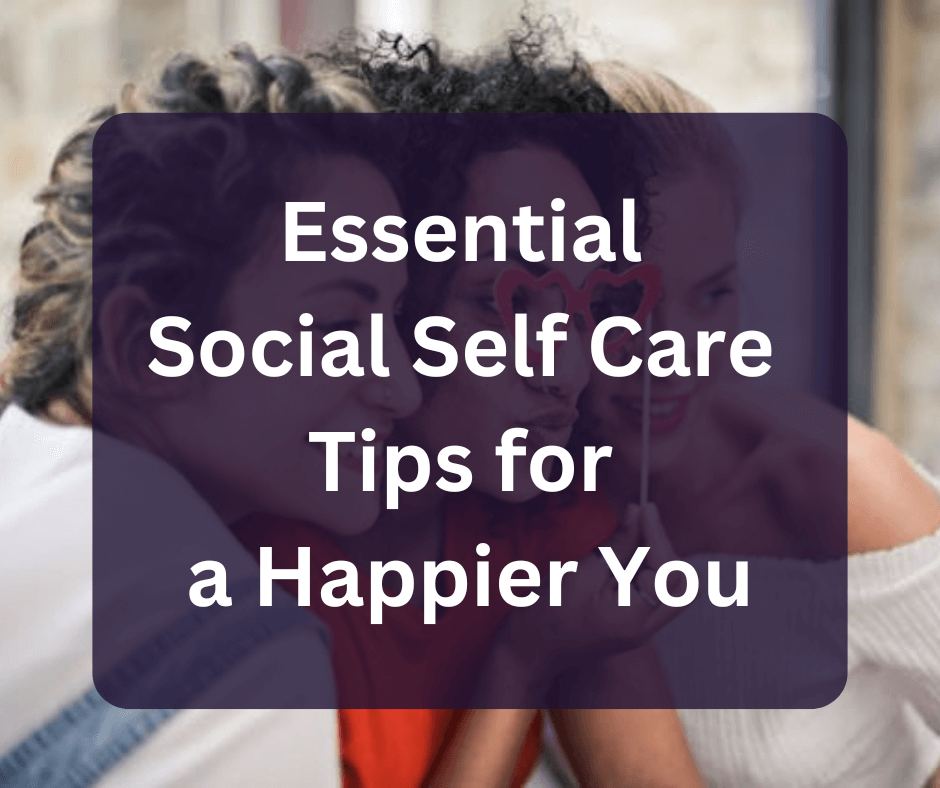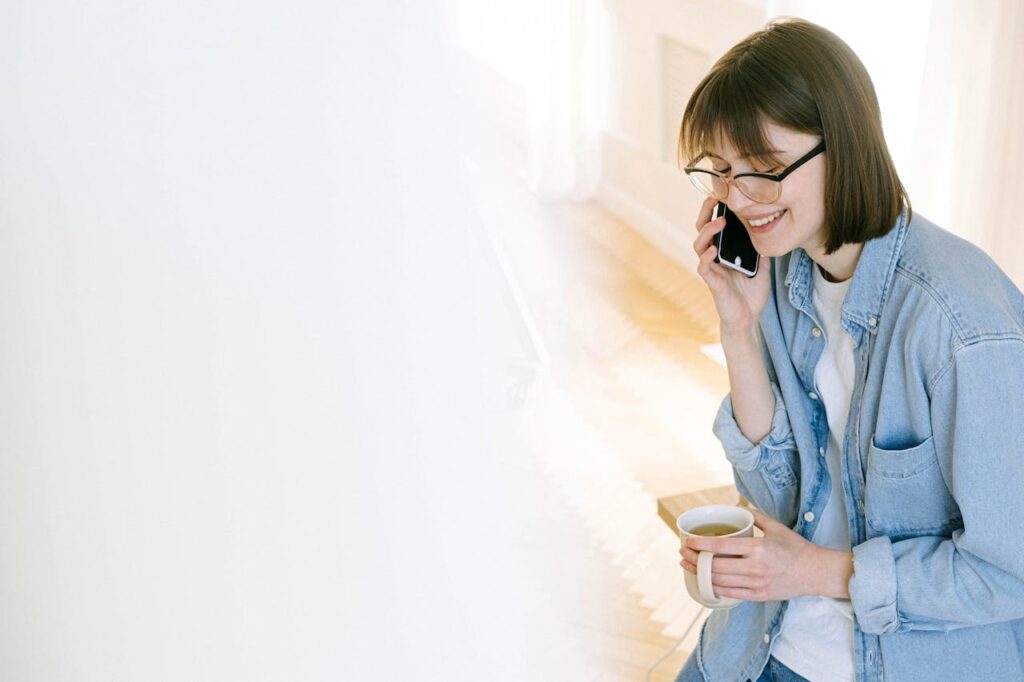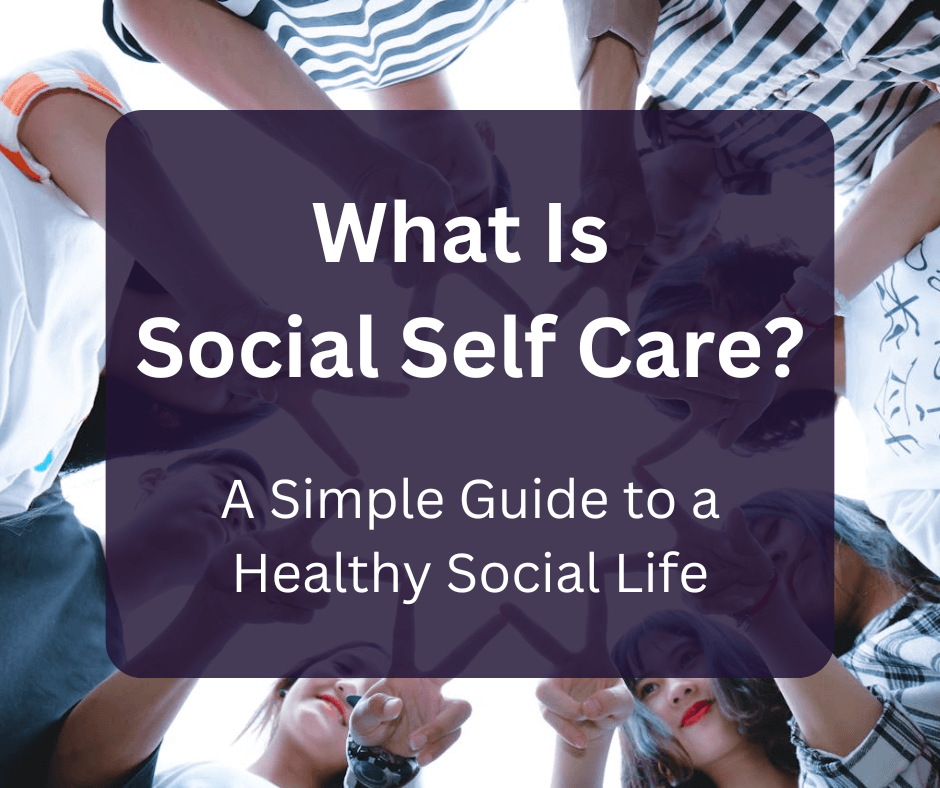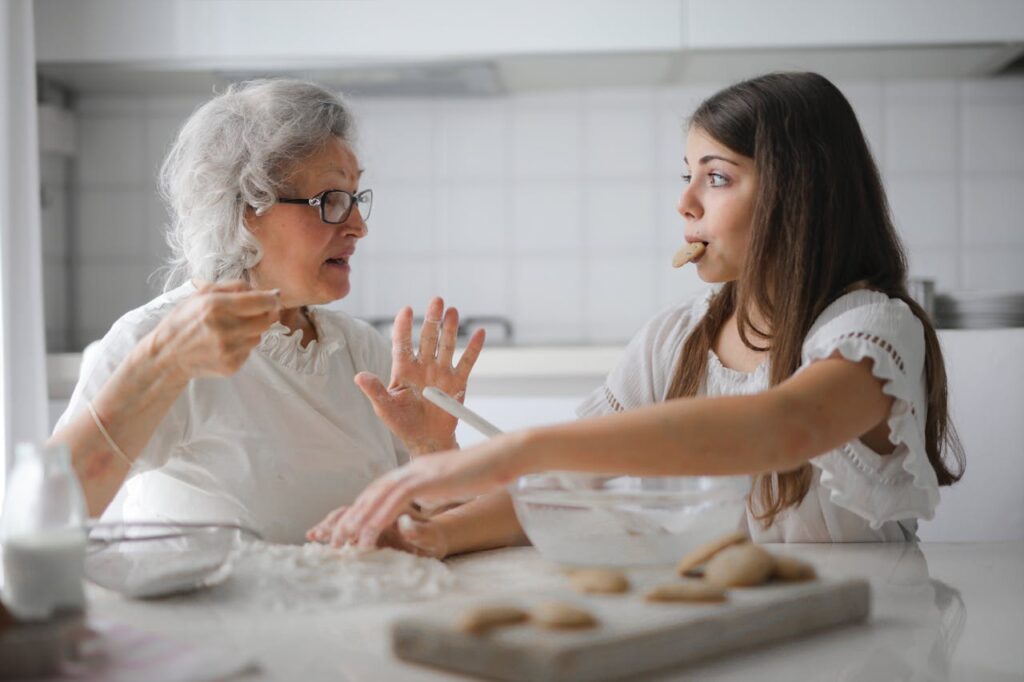We often focus on physical and mental self care, but social self care deserves just as much attention. Did you know that strong social connections can increase your lifespan by up to 50%?
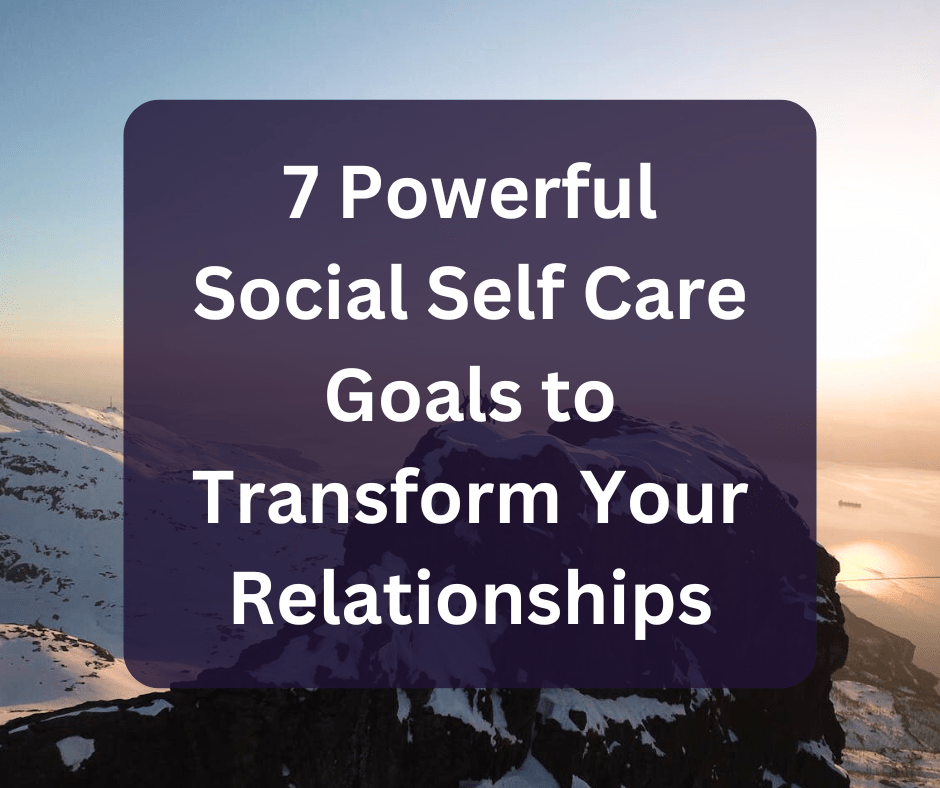
Social self care involves nurturing the relationships that matter most to you whilst also setting appropriate boundaries. It’s about finding that perfect balance between connection and solitude. In this comprehensive guide, we’ll explore seven transformative social self care goals that can enhance your relationships and overall well-being!
Why You Need Social Self Care Goals
We constantly set ourselves goals for our professional life, for our physical well-being etc. But we keep overlooking a key aspect when it comes to well-being: the fact that our social life is directly responsible for both our mental and physical health. Countless studies have shown that loneliness is responsible for earlier onset of debilitating illness (such as dementia), and even death. So why not consider social self care goals as well?
It’s absolutely paramount we start treating our social live with the seriousness it deserves. Just like we make time to go to the gym, we should make time to nurture our relationships, because they are just as important.
It is true that our lives are now busier than ever. We have so many responsibilities in a regular work day, that it feels impossible to add yet another task on top. There simply isn’t enough time in the day, right?
Well, having a strong social circle is so important for our health, that we should make time. It’s time for a life audit, and start re-shuffling some of those responsibilities. We also have daily habits that are wasting precious time, while giving us an illusion of disconnect or relaxation.
I am, of course, talking about social media. The average person spends over 7 hours a day staring at screens. Don’t tell me that all that time is productive. Anyone with a smartphone and a social media account knows what it’s like to get sucked into that black hole of doomscrolling.
Here are a few ideas to help you start a simple detox routine right now:
Now what do I mean by investing more time in social self care? Does this mean you should have some kind of social activity every day of the week? Well, if that’s something you enjoy and it works for you, sure!
But what I am proposing is increasing your social interaction compared to what you are currently doing. Because if you clicked on this article, chances are you suspect it’s not enough. Your need for social interaction will depend on your personality. If you are an introvert, you will need less social interaction than an extroverted person.
The goal is to create fulfilling and sustainable relationships. So let’s have a look at seven simple social self care goals that you can set for yourself, and you can start working on today!
Goal 1: Cultivate Deeper Connections with Existing Friends
The easiest way to begin your social self care journey is with the connections you already have. Deepen those friendships! Don’t be afraid to reach out to old friends, that you may have lost contact with. People are usually happy when someone reaches out. Maybe they thought about you too, but were too busy to check in, just like you.
Your surface friendships can be turned into meaningful connections as well. One way to do that is by investing more time into the relationship. We get closer and we trust each other by knowing each other better, and in various situations. So it makes sense that more exposure can bring about more opportunities to connect.

Another way to deepen your connections is by being more vulnerable with your friends. We trust more when we see that the person next to us is just as human as we are. Nobody wants a perfect friend. People who come across as perfect are intimidating. We crave connection with people who have the same problems, the same struggles as us.
So be the first to break the ice with your friends. Ask for advise, share your honest thoughts, and build that bridge.
Goal 2: Intentionally Expand Your Social Circle
If you’re anything like me, your social circle has probably shrunk during your adult years. When we have a full time job, we have more responsibilities and less time to nurture those connections. So it’s inevitable that some of the relationships we used to have might slip though the cracks. It’s easy to get lost in your day-to-day and neglect your social life.
But that doesn’t mean things should stay this way. You can get new friends and expand your social circle again. Don’t know where to start? Here are a few ideas of places and activities where you can meet new people:
- Join a club to find like-minded people. If you like reading, join a book club. If you play an instrument, you can join a band. Look for groups that centre their activity around a common interest. This way, you already have a something in common and it’s easier to break the ice.
- Volunteer. Find a group or organisation in your area that is fighting for a cause you care about.
- Use apps that are designed to bring like-minded people together, like meetup.
- Talk to your neighbours. Do them a favour or invite them over for tea. Get to know your immediate community.
- Don’t be afraid of age gaps. You can be friends with people who are younger or older than you. In fact, inter-generational friendships are great fr giving you perspective.
- Use social media. If you have digital friends, consider inviting them to meet in real life. If you clicked online, you will definitely have something to talk about in the real world as well.
Goal 3: Implement Digital Boundaries for Healthier Relationships
Whatever you do, don’t limit your social interactions to social media. That’s not real life, and your overall well-being will not benefit from these interactions.
Online communication only gives you the illusion of socialising, but it has none of the benefits. This is why I suggested to take your online friendships to the real world. Face-to-face interaction helps release those feel-good neurochemicals like oxytocin, dopamine and serotonin.
Goal 4: Practice Regular Social Rejuvenation
Identify those social activities that truly energise you and focus on them. Learn the difference between fulfilling and draining social interactions. Not every social activity is helpful, and you need to do what works for you.
If you don’t feel great at parties and you always find yourself thinking you’d rather be home, it’s ok to avoid parties. That’s not your thing. Find those activities that make you feel good. If you feel excited and energised after a social engagement, that’s for you. Pay more attention to your sensations during and after a social activity to get to know yourself.
You also want to make sure you create a realistic and balanced social calendar. You don’t want to burn yourself out by trying to tick as many social engagements as possible. There is no badge of honour for attending the most social events.
In fact, studies have shown that the quantity of relationships is not helpful in your quest for overall well-being. What matters is the quality.
Your social life should be rewarding, not draining you.
Here’s a guide on how you can focus on nurturing your relationships, while taking care of you:
Goal 5: Nurture Your Most Important Relationships
While you are focusing on expanding your social circle and making new friends, don’t neglect the most important relationships in your life: your family, your partner or spouse, your closest friends. It’s easy to overlook those relationships that seem to always be there regardless. Your loved ones may stick with you through a lot, but you don’t want to neglect or disappoint them.
Create meaningful social self care rituals and traditions with your loved ones, to make sure they are always a priority. Stay consistent in those rituals and don’t let anything get in the way. If Friday night is movie night with the family, then it’s movie night with the family. It’s blocked in your calendar, and any proposals can be re-assigned to a different day and time.
Always make sure you maintain the relationships you value. They need to be consistently nurtured, otherwise they will degrade. You want to make sure you invest in these relationships during stable periods of your life, when you have the time and energy to do so. This way, your loved ones will be a strong support system for you in your time of need.
In turn, you should always prioritise supporting your partners and family members through major life events and transitions. Community is about mutual respect and reciprocity.
Goal 6: Let Go of Draining Relationships
As I mentioned earier, it’s the quality – not the quantity of relationships that counts. If you have a friend that drains the energy out of you on a regular basis, that is not a healthy or nurturing relationships. You have to learn to let go of these connections which are counterproductive in your wellness journey.
If your friendship is not based on trust, reciprocity, honesty and respect, it’s time to re-evaluate. Here’s a list of qualities that can be found in toxic and, respectively, in healthy relationships:
Trust is healthy in a friendship; manipulation is not
Open communication is healthy; gossip is not
Reciprocity is healthy; one-sided-ness is not
A sense of security within your relationship is healthy; fear of reprisal is not
Boundaries are healthy; self-serving behaviour is not
Disagreement is healthy; fights are not
Respect is healthy; disrespect is not
Support is healthy; undermining or ignoring the other person is not
Honest feedback is healthy; sycophantic behaviour is not
Accountability is healthy; dismissive excuses are not
Constructive criticism is healthy; mockery is not
Don’t hesitate to distance yourself from relationships that consistently undermine your well-being. You can have an honest conversation, where you respectfully and calmly express your intention to “break up” with this person. This is a very delicate situation, since people are easily triggered by situations where they feel rejected.
So make sure your tone is calm and patient, and your words respectful. Don’t use accusatory language, like “you always do this”, “your behaviour annoys me” etc. Instead, talk about how certain behaviours make you feel, while always trying to see the situation from your friend’s perspective as well.
In case this is too much and you don’t see yourself having this kind of conversation, that’s fine. You can always distance yourself from negative connections gradually. Over time, taper off your encounters, and the relationship will naturally cool off.
Goal 7: Embrace Vulnerability and Authenticity
Last but not least, remember that one of the most important social self care goals you can adopt is embracing vulnerability and authenticity in your relationships. No matter how many friends you have, they will always be superficial friends if you can’t (or won’t) be yourself around them.
Friends are supposed to be your support system, so you shouldn’t be afraid of being judged or mocked. And I can assure you – your real friends will not be judgemental. They are in your life because they want to. And they want to support you, just like you are supportive of them.
Remember that real connection cannot happen if either of you is playing a role. Learn to be comfortable with your own imperfection, just as you are comfortable with other people’s imperfections as well.
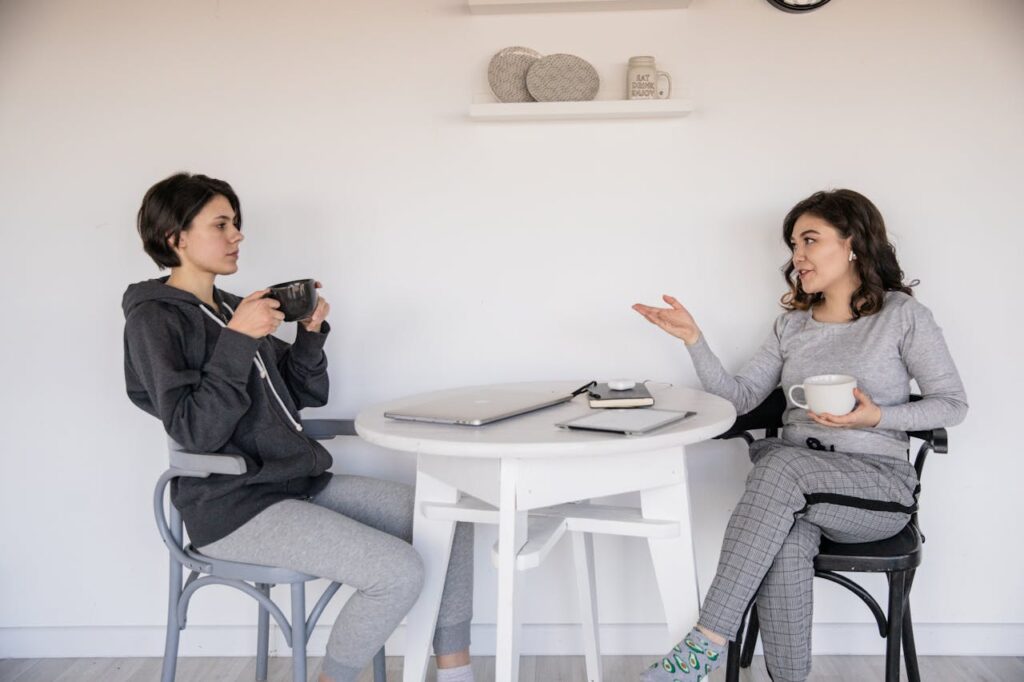
If you are not used to being authentic for fear of being judged, start with small steps. Start with your closest friend, and ask for their feedback. Talk about your insecurity and where you think it might come from. When you gain more confidence, extend the self-disclosure to other friends to deepen connection.
And of course – always be a safe friend for others to be vulnerable with you!
Conclusion
Implementing social self care goals isn’t just about improving your relationships—it’s about enhancing your overall quality of life. By nurturing important connections and letting go of draining relationships, you’re creating space for truly fulfilling social interactions.
Remember that social self care looks different for everyone, and it’s perfectly acceptable to adjust these goals to suit your unique circumstances and needs. Start with just one or two social self care goals from his list and notice how even small changes can transform your social well-being. Your future self will thank you for the meaningful connections you’re cultivating today!


